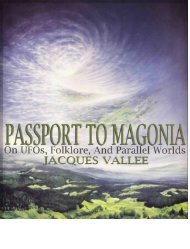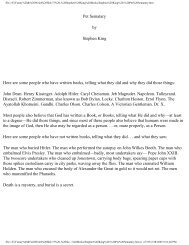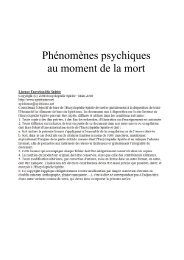extraordinary%20encounters
extraordinary%20encounters
extraordinary%20encounters
You also want an ePaper? Increase the reach of your titles
YUMPU automatically turns print PDFs into web optimized ePapers that Google loves.
(Goddess of Truth), Portia (Goddess of Justice),<br />
and Kuan Yin (Goddess of Mercy).<br />
Further Reading<br />
“Lords of Karma,” n.d. http://www.ascensionresearch.org/karma.html<br />
Kazik<br />
In September 1953, Albert K. Bender of<br />
Bridgeport, Connecticut, suddenly shut down<br />
his International Flying Saucer Bureau<br />
(IFSB), confiding to a few close friends that<br />
three men in black had threatened him and<br />
given him the frightening answer to the UFO<br />
mystery. Though Bender would provide few<br />
details, he hinted that the visitors were agents<br />
of the U.S. government. His alleged experience<br />
led an associate, Gray Barker, to write a<br />
sensational and paranoia-drenched book,<br />
They Knew Too Much About Flying Saucers<br />
(1956), about Bender and other supposedly<br />
silenced UFO researchers. Eventually, Barker,<br />
who had started a small West Virginia–based<br />
publishing company, persuaded Bender to reveal<br />
what had happened to him. In Flying<br />
Saucers and the Three Men (1962), Bender<br />
wrote that he had run afoul, not of a terrestrial<br />
intelligence agency, but of extraterrestrial<br />
intelligences from the planet Kazik.<br />
Bender’s IFSB had come into existence in<br />
April 1952 and was soon among the most successful<br />
of early UFO groups, claiming as<br />
many as six hundred members in a number of<br />
countries. Bender was also an enthusiastic science-fiction<br />
fan. A bachelor, he lived in a<br />
house full of artifacts from horror films, and<br />
at night, as he lay in bed, he would imagine<br />
himself sailing out of his body and into deep<br />
space. Soon, according to Bender’s book,<br />
weird things began happening to him. Strange<br />
lights and disembodied footsteps frightened<br />
him, and once glowing eyes, accompanied by<br />
a stench of sulfur, stared at him. With colleagues<br />
in Australia and New Zealand, Bender<br />
speculated about a saucer base inside the<br />
South Pole, and they laid plans for a research<br />
project to study that possibility.<br />
Kazik 141<br />
Bender urged his membership to try to<br />
contact the saucers telepathically at the same<br />
hour on March 15, 1953. While participating,<br />
he underwent an out-of-body experience<br />
and then heard a voice warning him to “discontinue<br />
delving into the mysteries of the<br />
universe.”<br />
A few weeks later, he returned home from a<br />
two-week vacation to smell the sulfur odor. A<br />
few hours later, three shadowy, apparitional<br />
figures dressed in dark suits spoke to him.<br />
They gave him a device with which he could<br />
contact them; all he had to do was hold it<br />
tightly in his palm and say “Kazik” over and<br />
over again. Two days later, he attempted contact.<br />
The experience initiated a series of encounters<br />
with monstrous beings who revealed<br />
that “Kazik” was the name of their home<br />
planet. They took Bender to their antarctic<br />
base, where they revealed their big secret: they<br />
had come to Earth to gather and refine sea<br />
water. They also told him that God does not<br />
exist and that there is no life after death.<br />
Bender was given a disc that monitored his<br />
activities and ensured his silence until they<br />
completed their business, which was in 1960<br />
when they departed from our planet. Bender<br />
was free to tell his story, which he did in a<br />
book that few, including (privately) Barker,<br />
saw as anything more than a not particularly<br />
interesting science-fiction novel. Two critics<br />
pointed to the story’s inherent implausibility:<br />
“The story lacks a good solid motive or purpose.<br />
. . . How could Bender or anyone else<br />
have discovered [the Kazakians’] secret until<br />
they chose to reveal it; and if they wished their<br />
secret to remain unknown, what possible purpose<br />
could they have had in revealing it deliberately<br />
to Bender, only to have to then force<br />
silence upon him, causing him physical pain<br />
and disturbing his peace of mind for the next<br />
eight years? . . . What was so significant about<br />
a few tons of sea water? . . . What had such<br />
entities to fear from anyone, if Bender did<br />
publish such a ‘secret’? Who would believe it,<br />
or be able to interfere with such an advanced<br />
civilization?” (Beasley and Sampsel, 1963).





